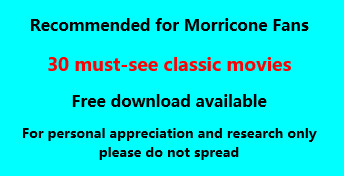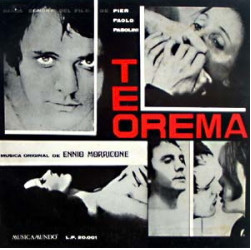THEOREM (1968)
Theorem is an unusual Italian psychological drama written and directed by Pier Paolo Pasolini, starring Terence Stamp, Laura Betti, and Silvana Mangano. Stamp plays a mysterious figure known only as “The Visitor” who appears in the lives of a typical upper-class Italian family, and one by one strips them of all their doubts, fears, and inhibitions through a combination of compassion, comfort, and sexual expression; eventually, the Visitor disappears as quickly as he arrived, leaving the family to come to terms with their new-found freedom and liberation on their own. The film has been studied extensively by film scholars over the years, many of whom have come to vastly different conclusions about Pasolini’s intent and meaning, the nature of the Visitor, and the film’s overall themes of divinity, sexuality, and consumerism.
Large parts of the score sees Morricone engaging in some of his most challenging classical scoring, writing music for layers of strings, woodwinds, the unique voices of I Cantori Moderni di Alessandroni, harpsichords, and numerous different percussion sounds in complicated, atonal, disorienting ways. Both the opening “Teorema” and the subsequent “Frammenti” are really challenging, and usually this sort of thing would turn me off, but the alienating soundscape Morricone creates is actually quite fascinating, especially considering how much is stands in tonal opposition to the rest of the score.
Both “Fruscio de Foglie Verdi (Cantato)” and “Beat N. 3” have an infectiously upbeat Europop aesthetic, John Barry-esque sultry strings, rock guitars, and lively percussion. The vocals in “Fruscio de Foglie Verdi” are performed with silky smoothness by Trio Junior and, really, they couldn’t be more different from the first two cues. They are almost from another world. It’s also fun hearing the whooshing wind effects in the background of “Fruscio de Foglie Verdi,” further illustrating how Morricone often worked with musique concrete-style real world sounds to add different dimensions to his scores. Similarly, the Spanish-inflected “L’Ultima Corrida” blends more Euro-pop beats with mariachi trumpets, electric guitars, and castanets, creating a fascinating and entertaining blend of styles.
The score for Theorem is completely schizophrenic, but superbly entertaining, and if you can get your head around a score which is a combination of super-challenging 20th century classical scoring with light pop beats and songs, then this might beone worth checking out. The score has been released many times over the years; due to its short running time it is usually combined with other scores as a 2-or-3-for-1 compilation. Other albums include it as part of a longer standalone release that also usually includes several classical pieces by Mozart. The version I have reviewed here is the one released by Japanese label King Records in 1994, which includes the Mozart excerpts. There is also a release from Swedish label Fin de Siècle Media from 2008, which combines the same tracks from Theoreom with music from the scores for the 1969 films La Stagione dei Sensi and Vergogna Schifosi.
Track Listing: 1. Teorema (4:15), 2. Frammenti (2:30), 3. Fruscio de Foglie Verdi (Cantato) (2:25), 4. L’Ultima Corrida (2:40), 5. Beat N. 3 (2:47), 6. Requiem (Mozart) (7:00), 7. Kyrie Eleison (Mozart) (2:40), 8. Rex Tremendae Majestatis (Mozart) (2:56), 9. Confutatis Maledictis (Mozart) (2:45), 10. La Rimosa Quies Ill (Mozart) (3:50), 11. Agnus Dei (Mozart) (3:40). King Records KICP-39, 37 minutes 28 seconds.












